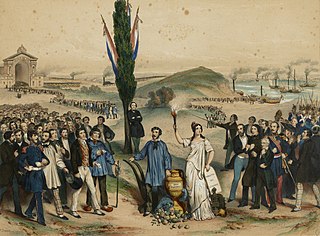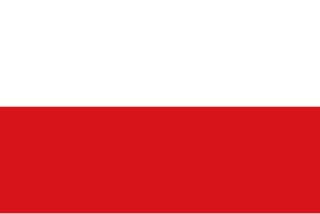
Count Kasimir Felix Badeni, a member of the Polish noble House of Badeni, was an Austrian statesman, who served as Minister-President of Cisleithania from 1895 until 1897. Many people in Austria, especially Emperor Franz Joseph, had placed great hope in Badeni's efforts to reform the electoral system and the language legislation in order to solve some fundamental problems of the multinational state, which eventually failed.

The Emperor of Austria was the ruler of the Austrian Empire and later the Austro-Hungarian Empire. A hereditary imperial title and office proclaimed in 1804 by Holy Roman Emperor Francis II, a member of the House of Habsburg-Lorraine, and continually held by him and his heirs until Charles I relinquished power in 1918.

General elections were held in Luxembourg on 13 June 2004, alongside European Parliament elections. The ruling Christian Social People's Party (CSV) of Prime Minister Jean-Claude Juncker won the election, increasing its number of seats to its highest since before 1989 and its share of the vote to levels not seen since the 1959 election.

Parliamentary elections were held in Austria on 1 March 1970. The result was a victory for the Socialist Party, which won 81 of the 165 seats to become the largest party for the first time in the Second Republic, only two seats short of a majority. Bruno Kreisky of the Social Democrats became Chancellor at the head of a minority government that was tolerated by the Freedom Party of Austria in return for electoral reform that favoured smaller parties. Voter turnout was 91.8%. It was the first Socialist-led government since 1920, and the first purely left-wing government in Austrian history.

General elections were held in Sweden on 15 September 1968. Held in the wake of the crushing of the Prague spring, it resulted in a landslide victory for the Social Democratic government and Prime Minister Tage Erlander. It is one of two general elections in Swedish history where a single party received more than half of the vote. Erlander would resign the following year after an uninterrupted tenure of 23 years as head of government.
Parliamentary elections were held in Czechoslovakia on 26 May 1946. The Communist Party of Czechoslovakia emerged as the largest party, winning 114 of the 300 seats with 38% of the vote. This was the best performance for a Czechoslovak party up to that time; previously no Czechoslovak party had ever won more than 25 percent of the vote. Voter turnout was 93.9%. As it turned out, this was one of only two even partially free elections held in what would become the Eastern bloc, the other having been held in Hungary a year earlier. It would be the last free election held in Czechoslovakia until 1990.

General elections were held in Luxembourg on 13 June 1999, alongside European Parliament elections. The Christian Social People's Party remained the largest party, winning 19 of the 60 seats in the Chamber of Deputies. It formed a coalition government with the Democratic Party.

General elections were held in Luxembourg on 12 June 1994, alongside European Parliament elections. The Christian Social People's Party remained the largest party, winning 21 of the 60 seats in the Chamber of Deputies. It continued the coalition government with the Luxembourg Socialist Workers' Party.

The Republic of German-Austria was a country created following World War I as the initial rump state for areas with a predominantly German-speaking population within what had been the Austro-Hungarian Empire.

General elections were held in Belgium on 26 June 1949. Several reforms took effect prior to the elections; they were the first after the introduction of universal women's suffrage; the number of seats in the Chamber of Representatives was increased from 202 to 212, and from now on, elections for the nine provincial councils were held simultaneously with parliamentary elections. The number of Chamber seats and the simultaneous provincial and parliamentary elections would remain unchanged until state reforms in 1993.

General elections were held in Belgium on 26 March 1961. The result was a victory for the Christian Social Party, which won 96 of the 212 seats in the Chamber of Representatives and 47 of the 106 seats in the Senate. Voter turnout was 92.3%. Elections for the nine provincial councils were also held.

Legislative elections to elect members of the Imperial Council were held in Cisleithania, the Austrian section of Austria-Hungary over several days in June and July 1911. A coalition of German national and liberal parties, the Deutscher Nationalverband, emerged as the largest bloc in Parliament, holding 100 of the 516 seats. Voter turnout was 80.2%.

Full general elections were held in Belgium on 14 October 1894, with run-off elections held on 21 October 1894.

General elections were held in Italy on 29 October 1882, with a second round of voting on 5 November. The "ministerial" left-wing bloc emerged as the largest in Parliament, winning 289 of the 508 seats.

Parliamentary elections were held in Portugal on 3 November 1957. The ruling National Union won all 120 seats.

The House of Lords was the upper house of the Imperial Council, the bicameral legislature of the Austrian Empire from 1861 and of the Cisleithanian (Austrian) half of Austria-Hungary upon the Compromise of 1867. Created by the February Patent issued by Emperor Franz Joseph I on 26 February 1861, it existed until the end of World War I and the dissolution of the Dual Monarchy, when on 12 November 1918 the transitional National Assembly of German-Austria declared it abolished. It was superseded by the Federal Council of the Austrian Parliament implemented by the 1920 Federal Constitutional Law.

Legislative elections were held in Austria on 15 October 2017. The Austrian People's Party (ÖVP) emerged as the largest party in the National Council, winning 62 of the 183 seats. The Social Democratic Party (SPÖ) finished second with 52 seats, slightly ahead of the Freedom Party of Austria (FPÖ), which received 51 seats. NEOS finished fourth with 10 seats, and PILZ entered parliament for the first time and came in fifth place with 8 seats. The Green Party failed to cross the 4% threshold and was ejected from parliament, losing all of its 24 seats.

Federal elections were held in Switzerland on 27 October 1872. The Radical Left remained the largest group in the National Council.































